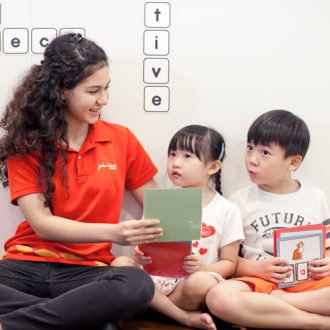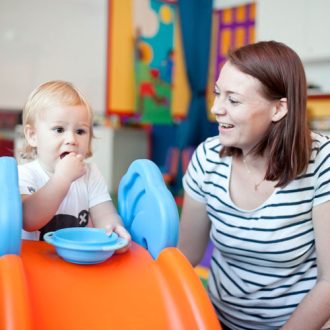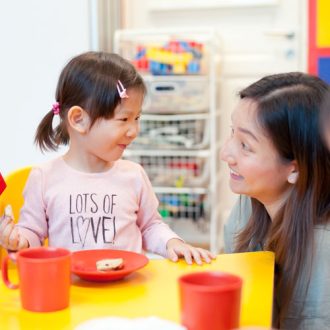
What exactly is ‘mindfulness’? What does it mean to be ‘mindful’? And how does the regular practice of mindfulness benefit our children?
Whether ‘minding your Ps and Qs’ (an English expression for watching your manners, being careful with the language you use or being on your best behaviour), minding where you walk (being careful not to bump into a lamp post or step on the snail in the middle of the pavement), or being mindful of what we say to someone and the tone we use so as not to hurt their feelings (being diplomatic with a response), what being mindful really boils down to is ‘awareness’. Being aware of our surroundings, being aware of how we make others feel with our words and actions, being aware of our own thoughts, feelings and reactions.
We can all benefit from mindfulness being part of our daily lives. Ironically however, the importance of being aware is not a behaviour or state of being many of us are actually automatically aware of!

We speak of mindfulness in several contexts. For example, being open to other possibilities and better informed about a fact, a culture or historical tradition. Mindfulness also involves focusing our attention or awareness on the present moment; being fully conscious of what we are experiencing in the now. It is the achievement of this mental state of wellbeing used as a therapeutic technique which is unfortunately often viewed as an unattainable goal by mere mortals or a suspect practice, followed by the yoga crowd or disciples of long-haired hippy gurus! The fact is that practising some form of mindfulness is highly beneficial to people of all ages from all walks of life, including young children. Learning to live in the present is a non-denominational practice that does not require memorising complicated rituals, chanting mantras or taking exams. It does require some initial conscious thought, regular and consistent practice to be truly effective, and ideally, some nurturing guidance from a more seasoned practitioner.
Just five to ten minutes of daily mindfulness practice has numerous benefits for our mental, emotional and physical wellbeing. Studies in adults and college students have shown how mindfulness helps in the workplace, with academic success, coping with health issues, speeds up recovery from an illness, can help combat anxiety and depression, aids in coping with stressful or challenging situations, boosts confidence and resilience, and establishes a sense of wellbeing, among many other benefits.
Practising mindfulness with children from very young has positive benefits for both the adults and children involved. Integrating mindfulness into our daily interactions helps teachers and parents self-regulate, become more emotionally aware and patient. When we do that and take the time to accept children’s feelings, needs and emotions without judgement, we help support their all round development.

Benefits of mindfulness practice to young children:
- Increases focus and attention span
- Improves listening skills
- Develops a sense of general wellbeing
- Improves the ability to cope in challenging or stressful situations
- Develops the ability to regulate emotions
- Increases empathy towards others
- Increases a sense of gratitude
- Develops observational skills
- Helps develop the ability to experience something or someone without judgement (older children)
- Improves emotional, social and mental development
- Improves cognitive abilities
- Increases resilience
- Increases the ability to solve problems / see solutions
- Increases levels of kindness
- Develops the ability to collaborate in groups and teams
- Improves academic performance
- Builds confidence to cope in social situations
- Develops greater behavioural self-control
- Improves tolerance and flexibility

Although some form of simple meditation practice can be taught to children, there are many other fun activities to do with them that can encourage mindfulness. Here are a few:

Run, run, run. STOP! Listen. Feel.
Ask your child how they feel before running or skipping around the room and then, how their body feels when they stop? Can they describe the sensations in their body?Slow observation / Walking meditation
Walk slowly, purposefully and silently along a path in the park encouraging your child to do the same. Try to keep the same pace and distance between each footstep. Try not to talk at all for five minutes. Look up, look down, look about. What do you notice around you? Afterwards, talk to your child about some of the things they noticed along the way.Beach combing
Visit the beach. Give your child three to five objects to look for. Can they spot them? What can you find together?Mindful snacking
Take the time during a snack or any meal time to eat slowly. Role model chewing your food mindfully, savouring every mouthful. Ask your child, “What does your snack [or named food item] taste like?” “Can you describe its taste, texture and smell?” “What emotion do you feel when eating this food?” Then, perhaps you can talk about how thy might feel if they could not taste their favourite food!Give a mindful hug
Ask your child to take three deep mindful breaths in and three deep mindful breaths out and then hug their sibling, carer, grandparent, you, or any other relative. Ask them, “How do you feel?” How do you think they [the person being hugged] feel?”Pet love
If you have a pet at home (a rabbit, cat or dog for example) encourage your child to sit quietly with them for a few moments. If small enough, let the pet settle down on your child’s lap. Encourage your child to stroke their fur gently and repeatedly. Again, can they describe to you how they feel in that moment and, how they sense the pet feels.

